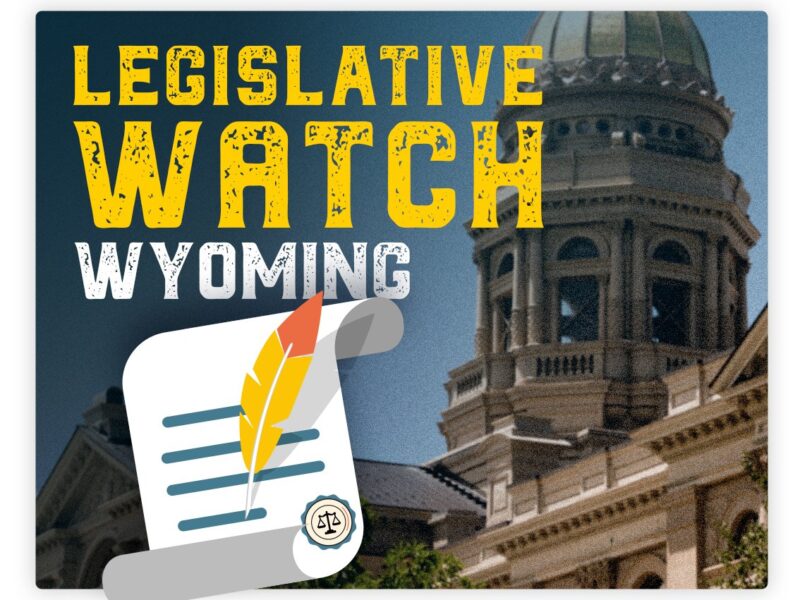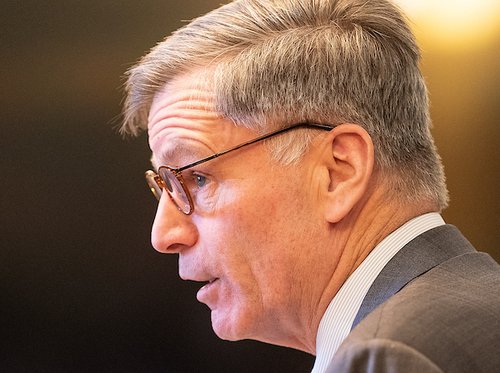LEGISLATIVE WATCH WYOMING: State to Issue Digital Dollar as Part of Crypto Push (Part 2)
Supporters say Wyoming’s stable token is alternative to central bank digital currency
- Published In: Politics
- Last Updated: Mar 21, 2023

By C.J. Baker
Special to the Wyoming Truth
As the State of Wyoming prepares to launch its own cryptocurrency, Gov. Mark Gordon finds the effort somewhat ironic.
Wyoming’s planned “stable token” — a digital representation of the U.S. dollar — is meant to provide a stable and trustworthy representation of the dollar that can be used on public blockchains, potentially facilitating cheaper and faster financial transactions. The state is looking to step in because, supporters say, the private companies that currently issue so-called stablecoins are not fully transparent or trusted.
But in some ways, the problem and Wyoming’s solution run counter to the ethos of cryptocurrency. When bitcoin was created in 2009, one of the overarching goals was to solve the “inherent weaknesses of the trust based model,” in which trusted, third parties — i.e. banks and other financial institutions — are needed to process electronic payments. With the use of a decentralized, publicly viewable ledger, or blockchain, bitcoin was meant to facilitate transactions that would be impossible to forge, censor or reverse and required no mediator.
In a letter explaining why he isn’t thrilled with the idea of Wyoming launching a new stable token, Gordon noted that the very first digital currencies were inspired by “the ideal of more straightforward, unregulated monetary transactions.”

“I believe this approach to be laudable,” the governor wrote, “although I must acknowledge the irony of implementing a government issued stable coin to further an expressed goal of fostering monetary transactions free from governmental regulation.”
Gordon previously expressed additional concern about Wyoming competing with the private sector, as various companies and entities already offer stablecoins, some using models similar to the state’s new token.
However, “private industry isn’t doing it well,” Sean Murphy, a Cheyenne-based blockchain investor and adviser, told the Senate minerals committee in January.
More broadly, though, Murphy said the real competition for Wyoming’s token is the Federal Reserve, which continues to explore the possibility of issuing a central bank digital currency or CBDC.
“Wyomingites do not want a CBDC,” Murphy testified. “We do not want one because it’s easy to track and trace digital currency and that’s exactly what’s going to happen with a U.S. CBDC and that’s exactly what’s happening with the digital yuan [in China]. It’s a mechanism of financial control.”
Sen. Chris Rothfuss (D-Laramie), who co-chairs the state’s blockchain committee, said a federal CBDC will likely come with “the capacity to do anything they want with your money, as the current banking system can do with your money.” In contrast with the tracking and tracing that the federal government will likely pursue with its digital currency, Rothfuss said Wyoming’s stable token will offer “independence.”

Finding uses skeptics
But the crypto industry continues to face heavy skepticism, particularly following a series of high profile collapses and bankruptcies over the past year. Last May, tens of billions of investor dollars were wiped out in a matter of days, when a so-called algorithmic stablecoin and an associated token on the Terra blockchain effectively became worthless. Revelations last fall that the exchange FTX had misused and lost billions of dollars of customers’ assets hit even harder, as company founder Sam Bankman-Fried was something of a favorite in Washington, D.C.
And while the Legislature continued to support crypto-related bills this session, there was less agreement on the stable token. The House didn’t debate the Wyoming Stable Token Act, Senate File 127, but members aligned with the conservative Wyoming Freedom Caucus generally voted no, making for a 36-25 margin of passage. Criticism in the Senate, where the bill passed 20-9, included some confusion about what exactly a stable token is and concerns about fraud, hacking or failure.
Sen. Larry Hicks (R-Baggs) said numerous digital currencies have collapsed because they “got ahead of the regulatory agencies.”
“My number one concern is that we’re so far out in front, that we have some [potential] regulatory holes that could ultimately relate to some level of fraud or collapse,” Hicks said of Wyoming’s proposed stable token, adding, “How are we protected from that?”
Rothfuss said Wyoming has rules in place for in-state firms that would have prevented some of the deceptive behavior that led to FTX’s collapse. And he noted that one of the core selling points of blockchain technology is their resistance to fraud, with asset transfers recorded on pseudonymous public ledgers.
“The current financial system is far, far more appealing to fraudulent behavior and counterfeiting and false claims and redundant requests for the same dollars,” he argued in January, referencing the 2007-2008 financial crisis. Crypto advocates say the more recent crises in the banking industry only bolster their case.
Preparing to make it happen
Rothfuss added that the state would comply with federal “know your customer” and anti-money laundering laws. That task and most of the work associated with issuing the tokens will be handled by outside contractors.

Wyoming will, however, hire an executive director and potentially other staff to run the program. They, in turn, will be overseen by a commission comprised of the governor, state auditor and state treasurer (or their designees) and up to four subject matter experts in virtual currency and financial technology.
Lawmakers set aside $500,000 to cover start-up costs, but Gordon questioned if that would be enough money and said he wished lawmakers would have spent more time developing a business plan for the project.
While backers of the bill want Wyoming to be the first to issue such a stable token, “”I think our office considers putting this forward and failing as a much bigger risk than not putting forward it all,” Gordon’s deputy chief of staff, Betsy Anderson, told the Senate minerals committee in January.
But the governor — who vetoed a similar proposal last year — ultimately relented and allowed SF 127 to become law without his signature. He noted that lawmakers made multiple changes to accommodate his concerns, which included removing language that required the state to issue its first stable token by the end of the year. Instead, the bill says the commission will “endeavor” to do so.
“I commit to working diligently as a member of the commission to achieve the goal of issuing a Wyoming stable token without undue delay but with proper safeguards for Wyoming’s reputation and treasure,” Gordon wrote in Friday’s letter.
One of the lingering questions is what the federal government — which appears to be in the midst of a crypto crackdown and has blocked other Wyoming initiatives — will make of a state stable token. There are some concerns that issuing or accepting a stable token could run afoul of the U.S. Constitution, which says states cannot “coin money” or make anything other than gold or silver coin as legal tender.
In the final words of his letter on SF 127, Gordon suggested the token’s success could hinge on the project being “unmolested” by the federal government.













